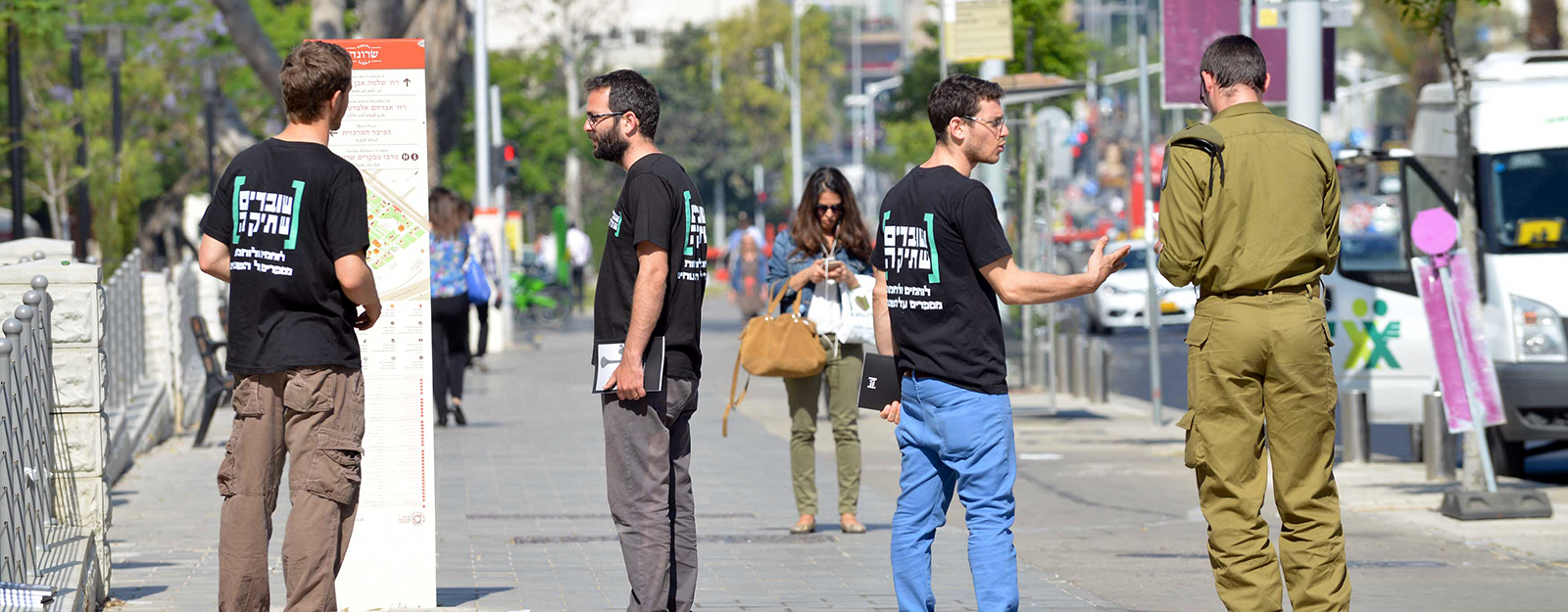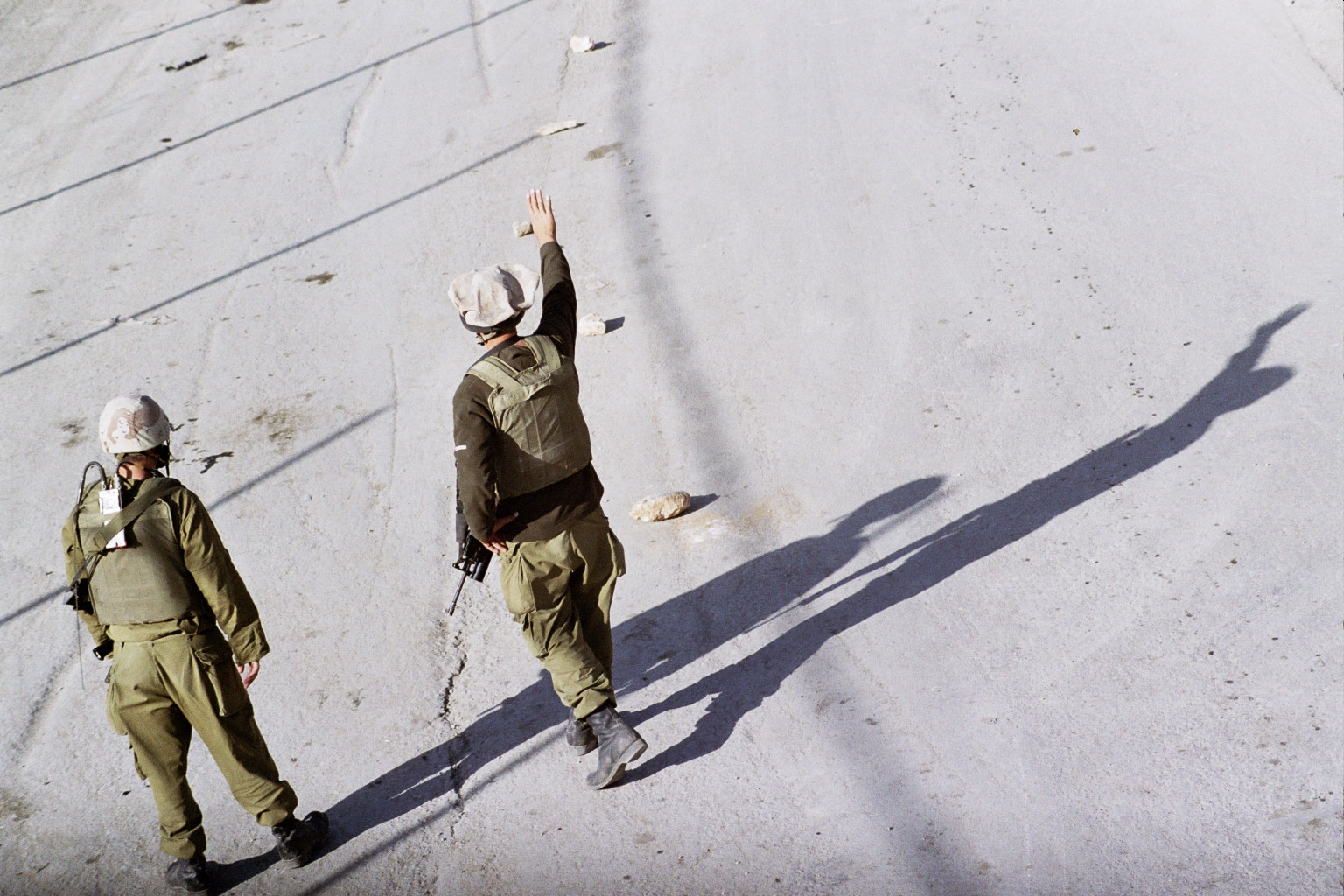Are you a farmer? No, but you know . . . Someone comes and says to you: “Okay, your home is now mine. Your land is now mine. Everything you invested in for forty years.” You know, older people, farmers. People for whom this tree is food. And you say to them: “Forget about it, get out of here, it’s no longer yours.”
Did you oversee the work? No, but I guarded there. There weren’t violent incidents. Again, because of how close it was to Israel. And if there were—then there were other units, who were more experienced in combat than we were, and they actually went into the city.
Do you remember meeting with these people whose trees they uprooted? Did they go there? Yeah, you meet them. You get to . . . It’s hard, because a person comes to you in tears.
Do you remember a specific incident? I remember one incident in particular. It gives me goosebumps just thinking about it. Someone whose olive grove they’d uprooted came to me in tears—I’m sorry, his fig grove—and he said to me, “I planted this grove for ten years, I waited ten years for it to bear fruit, I enjoyed it for one year, and now they’re uprooting it.” The guy had already worked thirty years, and he says to me, “I worked for thirty years to buy the land, I planted for another ten, and I just waited for the trees to bear fruit.” He’d only had a year to enjoy his trees, and then the IDF bulldozer comes and says: “Forget about it.” Best-case scenario—you meet a bulldozer operator who’s prepared to plant his trees somewhere else.
There was no replanting procedure? No, definitely not. The bulldozer operators were Arabs, and anyone who still felt some kind of relationship . . . whose heart still broke, then he’d take the hoe, dig, and replant the tree on their [Palestinian] side of the fence. It was rare that someone with that job would . . . It costs a lot, and his boss would say to him, “Why are you playing, stop playing.” So the uprooting happens on that same day and that’s it, afterward they’re already digging [to construct the Separation Barrier].
When you got there, was this kind of work just starting, or had it already been going on for a while? It was just beginning—it was really just starting the very first time we went into the field.
With the surveyors? Yes, our main duty was to protect the surveyors. The job of the surveyor is to take his radio and start walking the area.
The surveyors don’t see what’s going on? Even before the bulldozer arrives, they don’t see that there’s someone’s tree right there? Yes, but the landowner doesn’t realize that the guy walking on his land is the surveyor, he only sees the bulldozer. And even if he understood— what difference would it make?
They didn’t speak with them beforehand? I don’t think so. I don’t know. I imagine . . . They don’t have mail or cell phones for the most part. Someone with authority comes and takes your . . . It’s as if I were to come and take your cell phone—who would care? “Get out of here . . . if you want, sue me.” Even if you’re a citizen with a blue [Israeli] ID and all of its privileges, you try to get money from the National Insurance Agency and they tell you, “Yeah, good luck with that” . . . Like, so who is he [the Palestinian farmer]? You know what’s going to happen. You know that even if he sues and everything—he’ll just get lice.
The people there didn’t argue, or stand in front of the bulldozers? Trees, you know, you can’t give them back. There’s no compensation for something like that. They promised them they would give them money or something, or different land. There is a law that if the state takes more than 40 percent [of your land] you are entitled to full compensation. They can take up to 40 percent, and you can’t do anything. If they take 41 percent, you get full compensation. Which is a general rule in the state, it doesn’t interest them if it harms them or what’s on the land. I was unsure if they would take it. There is nothing to do. What do I mean, there is nothing to do? It sucks to see it, because they promised him they’d compensate him—your sense is that he won’t get anything.
How long did the work last there? When I left it was still [going on] . . .
So it took time. Building a fence is a big deal. Because you are talking about mountains . . . you dig the land, you measure it.
So the farmers didn’t resist at all? At first, when the bulldozer came to uproot the trees, the farmers burst into tears, trying to stop the bulldozer, standing on the side, crying.
There was no physical resistance, protest, not even a sign? There was—I saw them standing on the side with a sign, but we’re talking about farmers, not political activists. We’re talking about one man, who has really bad luck. You can’t say you’re harming an entire population. A single person controls a quarter, so you don’t even run into another person until you get to the next forty. Each time it’s just one person’s land. It’s not like you come to a university and there are tons of people. You’re not harming a single place full of people, each time you’re just seeing a single person. And then he has no power—he can only stand at the side and cry. There’s no farmers’ union. That in itself was heartbreaking, it’s not fair. You know, the idiocy of this country, they took this guy’s land, and tomorrow they’ll say they’re stopping construction of the fence. Which happened more than a few times. They decide the fence should be here—on the guy’s land, his courtyard, his private house—but tomorrow they decide, after they’ve already destroyed the roads, that the fence doesn’t work there, “Let’s get it out of here. Get it out, it’s no good there.”
Did they move the fence in your sector? A change in route.
No, in your sector—where you were. A change in route. They started digging, then all of a sudden they decided the location wasn’t right.
What’s this whole thing with the surveyors? A surveyor gets an order. The surveyor is the cheap part, you know what the hours are like for the excavator?
But the surveyor checks the land beforehand. Fine—in Israel we do things on a different schedule. First we do the excavating, and then only afterward we check to see why the location isn’t right.
Where did they move the fence to? Sometimes ten meters, sometimes they decided to cancel it or go around . . . because what’s the fence for? It surrounds the settlements. One settlement is included in the Green Line, one isn’t. They decide whether the fence should go around the settlement or not, and what the fence’s distance from the settlement should be—in other words, they deal with crap.









 testimonies
testimonies  media & content
media & content 










 The farmers burst into tears
The farmers burst into tears 

 terms of use & privacy policy
terms of use & privacy policy